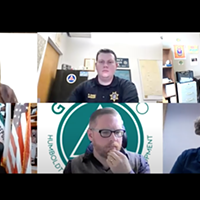Behind the Brown Act
Are Humboldt's growers disenfranchised or looking for special treatment?
By Thadeus Greenson [email protected] @ThadeusGreenson[
{
"name": "Top Stories Video Pair",
"insertPoint": "7",
"component": "17087298",
"parentWrapperClass": "fdn-ads-inline-content-block",
"requiredCountToDisplay": "1"
}
]
If a representative from Chevron lobbied the Humboldt County Board of Supervisors to change a draft ordinance into something more favorable to the company's interests, would you want to know who he or she was? Now, replace the suit from Chevron with a Southern Humboldt marijuana grower with mud on his jeans. Would that change your stance?
This is the central issue of a recent allegation that the Humboldt County Planning Commission trampled the state's open meeting laws by asking speakers to pen their names to a sign-up sheet in order to address the commission on a draft outdoor medical marijuana ordinance. The ordinance has been working its way through the county process for years, its current incarnation coming through a board subcommittee consisting of 3rd District Supervisor Mark Lovelace and 5th District Supervisor Ryan Sundberg (See "What to Plant?," May 1).
The planning commission has been wrestling with the draft for the last couple of months, and continues to do so as growers throughout the county begin planting this year's crop. The draft ordinance — which places strict limits on the size of grows on parcels of less than 5 acres — has drawn a fierce backlash from the county's southern stretches, where growers feel it is too restrictive. A group of growers has even banded together to form Green Cannabis, a nonprofit group formed to oppose the draft that it argues will push grows indoors, creating more pollution and more profit for energy companies in the process. Meanwhile, neighbors of marijuana gardens in Willow Creek and elsewhere are upset that the ordinance is still in draft form and they may be left to deal with another summer of skunky marijuana odors and other impacts from their neighbor's land.
This is the general context from which Fred Fletcher, a Eureka lawyer representing Green Cannabis members and other local residents, served the county with a legal notice demanding that the county declare all past public meetings regarding the grow ordinance "null and void" and conduct them again. Specifically, Fletcher is arguing that the commission's requirement that speakers sign in has had a chilling effect and is in violation of California's Ralph M. Brown Act, a 1953 statute that guarantees the public's right to attend and participate in local government meetings. The sign-in requirement, Fletcher argues, flies in the face of the Brown Act's aim of encouraging public expression and participation, and has effectively silenced growers who fear incriminating themselves while testifying about engaging in activities that are still federally illegal.
When the planning commission met on May 1 to again discuss the draft ordinance, speakers weren't asked to sign in. But, Fletcher said, the issue remains far from settled. Fletcher's allegations — which he says will be followed by litigation if the county doesn't acquiesce — prompted some interesting and conflicting discussion from a pair of the state's foremost Brown Act experts: Terry Francke, general counsel for CalAware, a nonprofit First Amendment Advocacy Group, who helped revise the Brown Act in 1994; and Peter Scheer, attorney executive director of the nonprofit First Amendment, who has litigated before the Supreme Court.
"I believe it's a violation," Francke said in a recent phone interview. "The Brown Act allows local bodies to enact and enforce reasonable standards, guidelines or regulations on speakers' comments. And the key term is 'reasonable.' Why is it reasonable to know exactly who is speaking, especially since there is a tradition of constitutional conclusions that people do have a First Amendment right to speak anonymously when addressing the government or talking about government issues?"
The Brown Act is clear in prohibiting government bodies from requiring citizens to sign in as a prerequisite for attending an open meeting as it may deter people from coming and participating, Francke and Fletcher both point out. But, Scheer said, attending a meeting and addressing a government body are two very different things. (Virtually all local governments ask residents to identify themselves and state their area of residence before addressing councils, boards and commissions during public comment periods, though enforcement of the provisions vary greatly).
Sure, Scheer said, there are some cases that recognize that the constitution protects the right to anonymous speech in broad terms. But can that really carry over into a public government meeting and, perhaps more importantly, should it?
"The problem is the context we're talking about," Scheer said. "It is impossible to both attend, stand up and be seen in front of everyone else at the meeting and be anonymous. The constitutional argument doesn't really apply given that context. But as a policy matter, I think it's fair to ask, 'Why shouldn't any legislative body be able to know who is addressing it, who is standing before it and urging some action?'"
Think of the myriad of special interests that constantly lobby governments, Scheer said. Do we really want them doing so without identifying themselves?
"Imagine Congress holding a hearing and people getting up and commenting on a provision of a major bill that's being drafted and refusing to identify who they are or who they're being paid to represent," Scheer said. "That would be silly, and I think it would be no less silly to argue that you have a right to participate that way in front of a local government body. ... I care about these issues, but I think that democracy, in fact, depends on people knowing who is speaking to them and that there's nothing wrong with requiring that people stand behind their words and identify themselves if they want to participate, if they want to be civically engaged and active."
Francke agreed there shouldn't be any problems with folks identifying themselves when addressing local government in most cases. But, he said, there are some situations that warrant anonymity. "In most cases people will not have a problem giving their true identity because they're trying to get help with something or trying to address a problem, but in some cases people want to express a controversial viewpoint that they believe could leave them open to retaliation if their identities are known and traceable," he said, adding that people in those situations should be allowed to participate.
Fletcher said it's important to keep in mind that this is an issue that could carry some consequences for growers. Not only does marijuana remain federally illegal, he said, but a Department of Justice memo recently surfaced urging U.S. Attorneys to seek out and prosecute growers who are politically active.
"I see this issue as fundamentally different," he said, adding that the growers among the dozen-or-so people he represents are truly scared of outing themselves in a political setting. "This issue has created a class of people who are politically disenfranchised. They're called names: douchebags, potstitutes, grow hoes and other derogatory things."
Fletcher said he's glad the planning commission has removed its sign-in sheet. However, he said, that doesn't undo damage already done. Fletcher said the county needs to declare its previous meetings null and void and hold them over again. However, he said his clients may be amenable to a compromise if the county were to hold a pair of well-publicized public meetings on the topic to gather additional input on the draft ordinance.
No matter how the county opts to move forward, Francke said there's another way for folks who work under the cloak of prohibition to participate in the process if they choose. They can always lie.
"People are, of course, free to use any name," he said. "They're not under oath and there's no legal compulsion to give their actual identity. So, if they're nervous about their name being traced, they can always use a phony one."
Speaking of...
-

Public Meetings When the COVID State of Emergency Ends
Jan 24, 2023 -

Will Women Rule in the 2022 California Election?
Sep 22, 2022 -

How to Run Your Life Like a Public Meeting
Jul 28, 2022 - More »
more from the author
-
Seeking Salvation
'Living in amends,' a candidate for resentencing hopes for another chance
- Apr 18, 2024
-
UPDATE: Artillery Shell Deemed Safe in Ferndale
- Apr 12, 2024
-
Turning the Titanic
Cal Poly Humboldt recognized for leadership in addressing global plastics crisis
- Apr 11, 2024
- More »
Latest in News
Readers also liked…
-
Through Mark Larson's Lens
A local photographer's favorite images of 2022 in Humboldt
- Jan 5, 2023
-
'To Celebrate Our Sovereignty'
Yurok Tribe to host gathering honoring 'ultimate river warrior' on the anniversary of the U.S. Supreme Court ruling that changed everything
- Jun 8, 2023
































